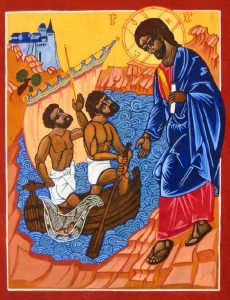HOMILY SUNDAY 5-C
Call and Response
(Is 6:1-2, 3-6; Psalm 138; 1 Co 15:1-11; Lk 5:1-11)
*********************************************************
How often do we think of ourselves as disciples of Jesus, following him along the way to salvation?
Today, we are called once again by Jesus to follow him as his faithful disciples

Catch of fish, Clyde Rausch
The Gospel passage, set on the shores of the lake of Gennesaret, is a classic story of a biblical call and response. What is remarkable here is the humble obedience of Peter. He and his companions were washing and mending their nets. They had put in a night’s work with no results, and they were done for the day. The last thing in their minds was to go out and try fishing again. Yet somehow, perhaps because Peter was so taken up by the tone of Jesus’ teaching from his boat, he promptly set out to cast their nets at Jesus’ command. The result was an amazing catch of fish, nets overflowing, that was a prefiguring of the multiplication of the loaves sometime later, with seven and twelve baskets overflowing.
That extravagant gesture on the part of God through Jesus drew from Peter a noteworthy response – that of painful self-awareness of his own unworthiness and sinfulness, and even more important, of repentance. He was experiencing within this event, the forgiveness and acceptance of Jesus, as he was. Then Peter and his companions left their nets, their livelihood, and obeyed Jesus’ call to follow him. This set them apart from the people who witnessed this event and remained simply in the state of amazement, which falls short of a faith-filled response.
The second reading from Isaiah parallels the gospel in some ways. In Isaiah’s vision, the Lord is on a throne with angels adoring him. In the Gospel, Jesus is on the shore, and then sits in Peter’s boat to teach. Isaiah’s response to his vision is similar to that of Peter; painful self-awareness and repentance. Isaiah receives purification from the seraph and the burning coal touching his lips, and then receives the call from God to go out and speak to a stubborn people who refuse to change, to understand. That element here is unique to Isaiah, although we know that the apostles eventually will be also sent out to face an often hostile and resistant world.
The second reading takes us to the beginning of the Church following the event of Pentecost. Paul is reminding his readers of the Good News of Jesus’ death and above all his resurrection. Paul outlines a pattern of the revelation of that Good News, how according to him, Jesus appeared first to Peter, the first leader, then to a large group of disciples. After that he appeared to James, the leader of the Jerusalem church, then to all the apostles, the successors to the prophets, and finally to Paul, the apostle to the gentiles. For Paul, this was all a carefully planned revelation of the Good News of salvation through Jesus Christ and now through the Church, the followers of Jesus. For him, this is all a work of God’s grace in the lives of the believers, and based on the reality of the resurrection of Jesus from the dead, upon which the whole reality of salvation rests.
Fr. Bob Berringer, in his presentations to the Western bishops on retreat in Mission, BC, spoke of a disciple as first of all a learner, learning the mind of Christ. He then went on to describe a disciple as a follower, one who has a direction and purpose. He also described a disciple of Jesus as one who imitates the master, who tries to become a carbon copy of the master. He included a surprising dimension of a disciple as someone called to do even greater works than Jesus, in the sense that the disciple shares in the life of the Spirit of the Risen Jesus and is sent out to the whole world to make a difference. Lastly, the disciple is called to build up the Body of Christ, the community or koinonia.
All of these elements of discipleship can and should apply to us. We are called to learn the ways of Christ, to put on the mind of Christ. We are also called to follow Jesus, to walk with him in ministry and service. Our goal should also be to become more and more Christ-like, to become a carbon copy of Jesus. We are also called to do even greater works than Jesus did, in the power of the Spirit of the Risen Lord that he so freely shared with us. And finally, we are called as disciples to be community builders, building up the reign of God, within the Church, the Body of Christ.
The Eucharist began at the Last Supper, where Jesus gathered at table with his apostles before his death on the Cross. It is rooted in biblical events like the recognition of Jesus at the breaking of bread at Emmaus and the miracle of the multiplication of the loaves. It flows out of the early Church gathering almost daily in the Acts of the Apostles to break bread together.
As disciples of Jesus, we now gather around the table of his Word, and the table of the Eucharist, to remember what Jesus and the apostles did, and to share in that life-giving power of his love poured out for us on the Cross. May our celebration today, help us to appreciate our call to be disciples, and to live it more fully in our words and actions each day.



